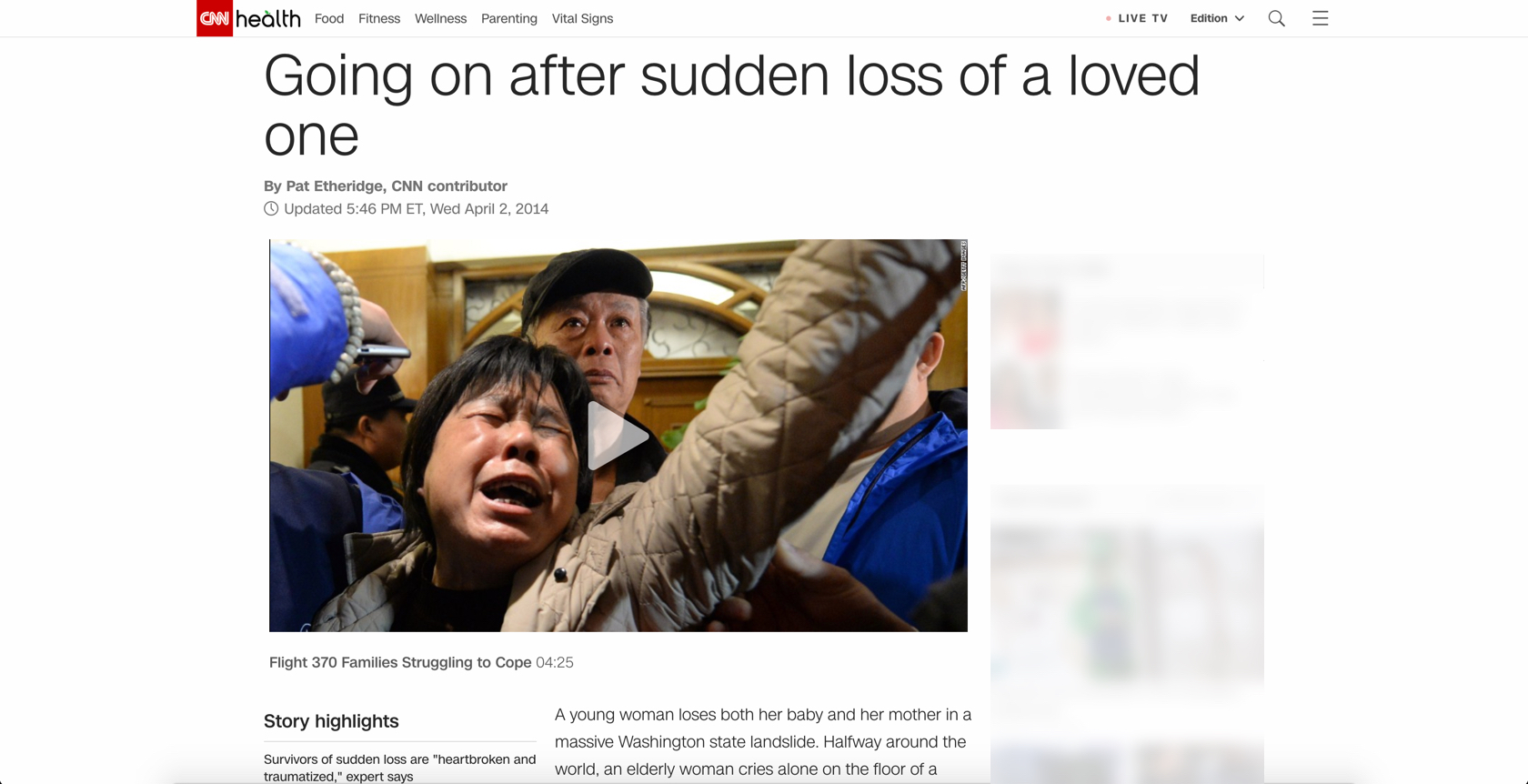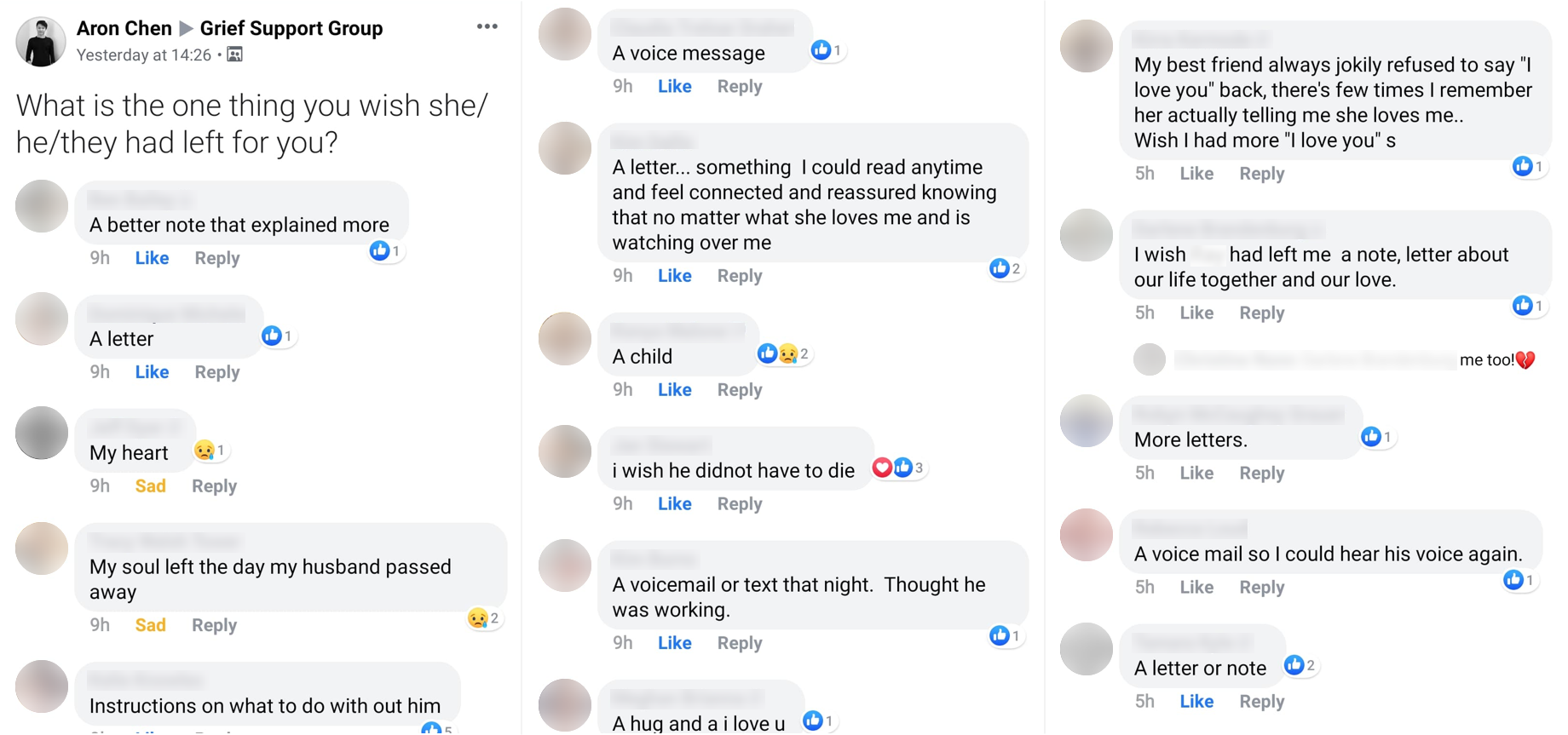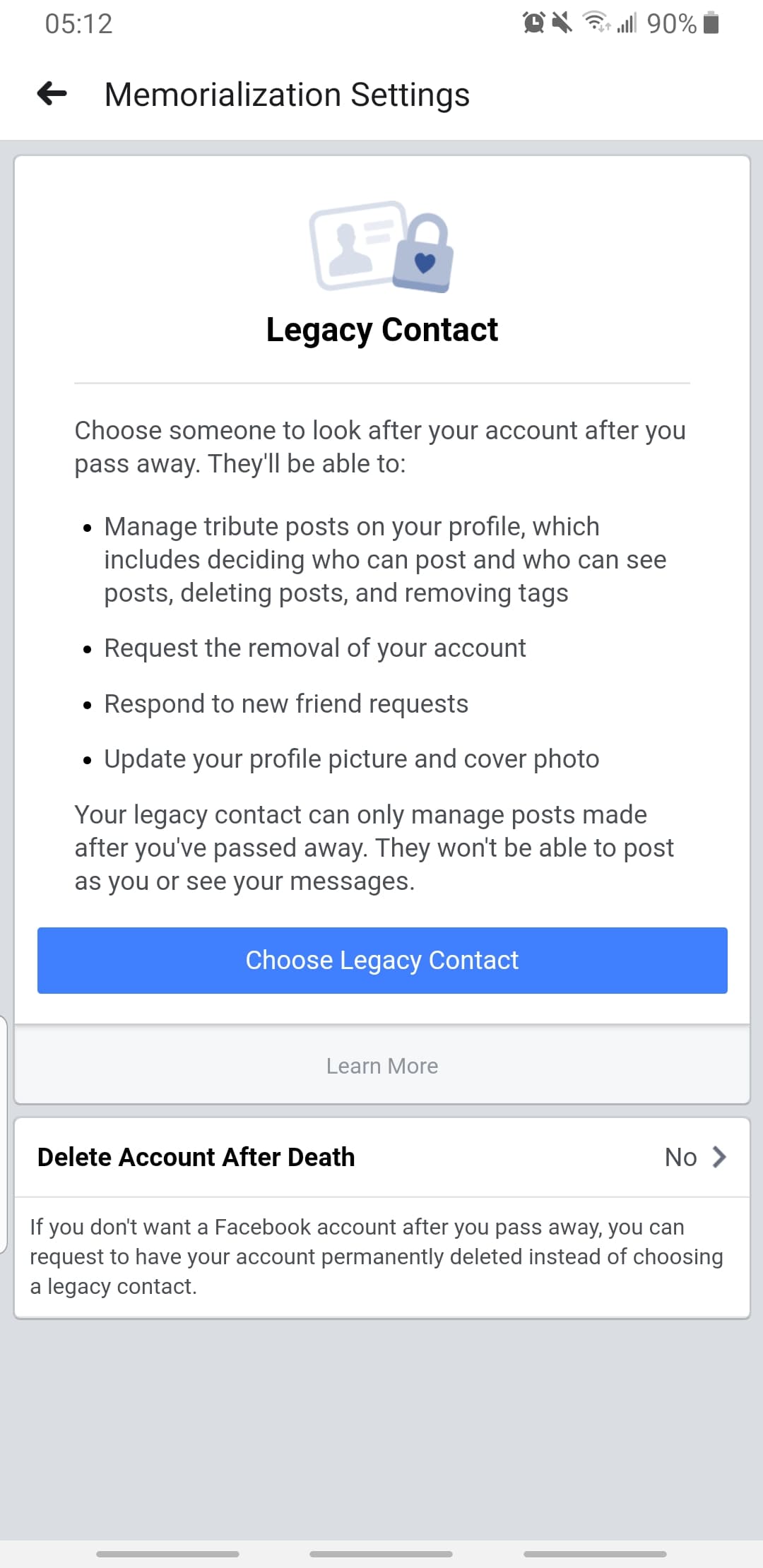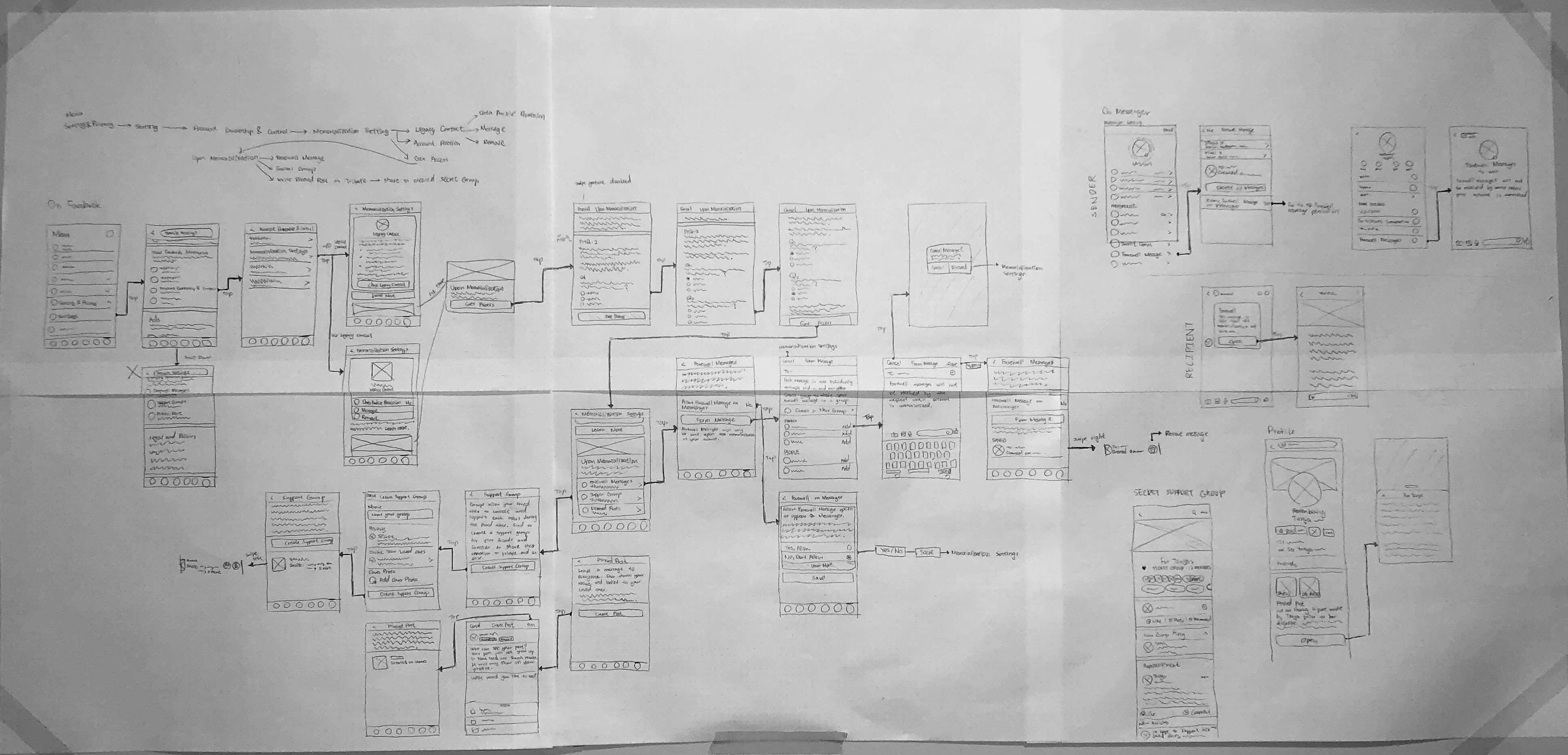

Facebook Post-Memorialization is an integrated experience that empowers the users who want to continue to support their loved one in case of their death. Upon their accounts being memorialized, users can deliver farewell letters to individuals, create a secret support group for their friends and families, and pass down their values and love through a pinned announcement on their Facebook profile. It is a personal project that was inspired and driven by my childhood memory.
How might we continue to support our loved ones even after our death?
Just Me!
Sketch, Principle
Case Study
3 Weeks (Summer 2019)
As a product designer, I have devoted myself to bringing joy and happiness to people's lives. I believe in achieving my goal; we must first reduce the unnecessary suffering that each individual experiences. The story began when I was 12; I got into an accident which sent me to the emergency room. To me, that was my first near-death experience. However, instead of being terrified of the pain, what left me a life long memory was my father's worried face. As he held on to my fractured arm while waiting for the doctor, I asked myself, what if I died today, what would happen to the people I love?

Since the incident, I have been living healthily and in no shape or form am I close to death. Yet, I can't help but continue to wonder what could've happened to my parents and my brother if I were to die on that day. Death is a natural part of our lives. While I try to live my life to the fullest, I worry what would happen to my loved ones if an adverse event was ever to happen to me. Particularly my father, who tend to be more emotionally vulnerable than my other family members.
According to the article on CNN(2014), people who experience sudden losses face an extraordinary challenge to grief and mourn. The lack of time and warning to accept the incident have caused an inability to move forward with their lives. While other end-of-life experiences get to bring closure to the deceased by saying words such as ‘I love you,’ survivors with sudden losses do not.

With Prolonged Grief Disorder being added into the ICD-11 — the International Classification of Diseases, I wanted to help support people who encounter sudden losses of their loved ones. Grief is a natural process that occurs to everyone, but disorders such as the PGD should not be part of the necessary suffering. If design can help to improve the end-of-life experience of the dying, could it also help to support the survivors to grieve and mourn?
From my secondary research, I learned that one of the significant factors that determine the survivor’s experiences is the ability to bring closure to the relationship with the deceased. People who lost their loved ones due to extended illness or advanced age are less likely to experience Prolonged Grief Disorder. They were given the time to grief along with the dyings. Together, they gradually embraced reality and were able to share their love and say goodbye to each other. On the other hand, people who encountered sudden losses of their loved ones did not have the same chance to reconcile with the deceased.
When I posted a question in a Facebook group named Grief Support Group asking, “What is the one thing you wish she/he/they had left for you?” Many had responded that they simply wished for more “words” from the deceased. Letters, voice messages, songs, instruction on what to do after their departure, or even a simple goodbye can have such an emotional impact on the survivors. To the bereaved, they wanted to be able to remember their loved ones and words often are the most effective medium to do so.

Memorialization is a powerful feature that turns Facebook into a place for people to honour the memory of their loved ones. Users can assign legacy contact to allow their families to manage tribute posts, request to remove the account, and respond to new friend requests. Ultimately, these memorialized profiles have become a place for people to support one and the other.

Legacy contact can perform actions such as manage tribute posts, request account removal, and swithc profile photo.
Recognizing the usefulness of the feature; however, the memorialized setting experience lacks empathy for the users to take initiatives in supporting their loved ones upon their death. By leveraging the existing tools on Facebook, such as Groups, Messenger and Pinned Post, I want to empower the people who hold similar concern like mine. So, even in the case of an unfortunate accident, we could still continue to support our loved ones to move forward in their lives.

Adapting to the existing pattern on Facebook, I have created Facebook Post-Memorialization within the Memorialization control setting. By capturing moments when users wanted to assign their legacy contact, we would introduce features that could further allow them to continue to support their loved ones upon their accounts' memorialization.
Entry point to discover Facebook Post-Memorialization.
The core purpose of Post-Memorialization is to deliver words and messages to the users' beloved families and friends. Farewell Letter was created precisely for that by adapting the Messenger app experience. It allows users to write their messages using preexisting functions such as voice and video recording. These saved messages will send when users' accounts become memorialized. Instead of displaying the letter in the conventional messenger UI, Farewell Letter simulates the physical act of opening a letter to convey a sense of formalness. The recipients can also save and store the message on their own devices so that they could access it even when they are offline.
One of the things I realized after reading this article is that people wish to support their loved ones on a particular day. In the article, it was the daughter's birthday. To the others, it could be wedding anniversy, Christmas, or Thanksgiving day. For that reason, I've added the feature to allow users to set schedules on when to deliver Farewell letters.
Form a Farewell Letter for your loved ones.
Preview of receiving a Farewell Letter.
Part of my biggest worries to the "What if I'm gone" scenario was the potential lack of social and emotional supports for my family. This is especially crucial since some people could isolate themselves during the process of grieving. Support Groups were designed so that users could gather the people they care so dearly about and create a private environment to allow them to support one and each other. Users would assign their legacy contacts to become the group admin and can post an announcement to share her/his/their value and love to the group. To differentiate Support Group from other regular groups, figures of plant and heart are placed overlaying the cover image. Due to the nature of the support groups, the privacy setting is restricted to "Secret" to prevent others from discovering them.
Create a Support Group for your loved ones.
Preview of a Support Group.
Unlike the announcement users could make in Support Groups, Pinned Announcement is made to be shared in public. These announcement posts will appear on the user's memorialized profile with a section named "Words from [User's name]." They act as the digital version of an ethical will — a way to communicate your values, experiences, and life lessons to your friends and families. Also, they provide a chance for the user to say goodbye to the ones he/she/they love once and for all. Instead of having the families to go through a potentially challenging experience of announcing their deaths, pinned announcement allowed the users to deliver that message for them.
Save a Pinned Announcement to share your values and love.
Preview of a Pinned Announcement on a memorialized account.
From my post in the private Facebook group, many people had also wished for their deceased loved ones to leave them certain forms of financial support. Whether it is for the funeral, memorial service, or childcare cost, the loss of a loved one would often cause an additional expense or some financial concerns. This is especially vital when the person who passed away plays a significant role in supporting the family’s finance. While purchasing life insurance would undoubtedly contribute to the cause, many existing barriers, such as different financial priorities or the lack of awareness, have prevented people from doing so. For that reason, I’d created Planned Fundraisers in hopes of providing an alternative way to allow Facebook users to support their loved ones financially.
Plan a fundraiser to support your loved financially.
Preview of a Planned Fundraiser on a memorialized account.
Grieving is a natural process of life. Yet, due to the unexpected sudden incidents, the bereaved are forced to experience unnecessary sufferings. Understanding each individual mourn differently from one to another, I wanted people to be the ones to create what could help to support their loved ones. From talking to the people around me, I learned that most of them tend to avoid the topic of death. While it is certainly a challenging experience, I genuinely hope that people would take initiatives to plan for both their end-of-life and afterlife experiences. Whether it's getting insurance, designing your own funeral, or making a voice recording of you saying, "I love you." Every small step can make a significant impact in supporting your loved ones. That's the motive behind Facebook Post-Memorialization— to provide a place so people could take little steps and bridge the connections between the people and their loved ones.
As an ending note, here's another question I posted in the Grief Support Group. If you were to pass away at this moment, what is the one thing you would like to do for your loved ones?
Thank you!